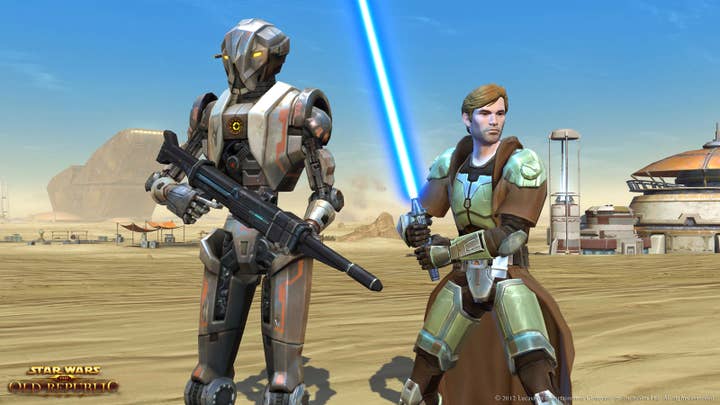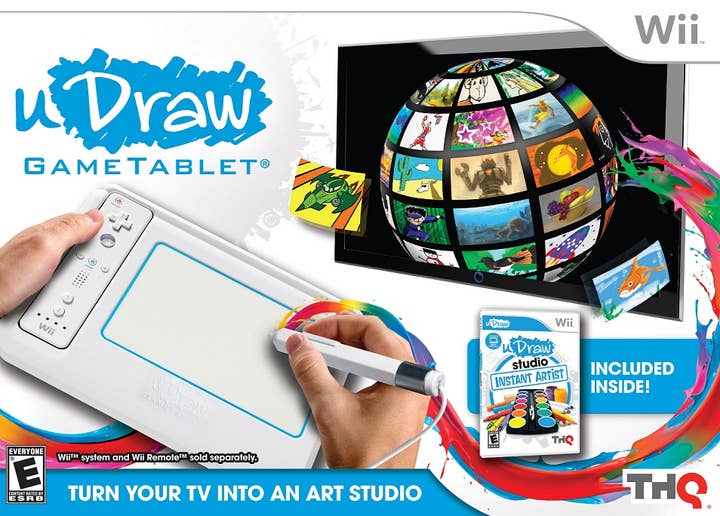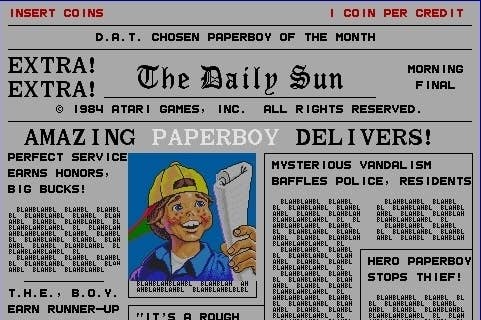News of the Year - Part Two
A couple of booms, a couple of busts, and a whole lot of outrage round out our top 10 stories of 2012
Yesterday, we started counting down the top 10 news stories, trends, and themes of the year. Today, we close the book on 2012 (a bit prematurely, we acknowledge) with the top 5, stories that we felt re-shaped the industry, cases where the conventional wisdom was outright wrong, or perhaps a little conservative. Some of these stories go a long way toward defining the industry's future, others bring closure to eras of its past. They'll define conventional wisdom heading into 2013, even if next year is likely to prove it off the mark just as many times, and in just as many degrees. But that's a discussion for another year. For now, for this year, here's what we'll remember when looking back at the defining moments of 2012.
5. Free-to-play in it to win it
This may be the most important trend in gaming right now, but it is by no means new. The free-to-play sector has been on the rise for years, and the last 12 months merely inched forward an ongoing tectonic shift, the most obvious casualty of which was EA and BioWare's Star Wars: The Old Republic.

Things started well for the heavily hyped MMORPG that launched late in 2011. Analysts rang in the New Year citing The Old Republic as evidence of a healthy MMO market and EA reported 1.7 million subscribers.
However, The Old Republic turned to the Dark Side by mid-year. BioWare denied speculation that it was in decline in April, only to institute layoffs on the team less than a month later. By July, the battle was lost, with EA confirming The Old Republic had dropped below 1 million subscribers and announcing it would be going largely free-to-play.
The Old Republic wasn't the only free-to-play convert this year. Microsoft launched the first free-to-play Xbox 360 game in Happy Wars. Epic Games' Tim Sweeney said the free-to-play movement is "more and more inevitable." EA COO Peter Moore also called the move to free-to-play inevitable, suggesting that all games would eventually be driven by microtransactions.
Even the business model's detractors are finding themselves forced to come around. 22 Cans founder Peter Molyneux expressed no small amount of disgust at the more greedy, mercenary approaches free-to-play developers have taken, but that hasn't stopped him from exploring the business model with his studio's first game, Curiosity. Twisted Metal designer David Jaffe announced that he was making a free-to-play game, acknowledging that it's a format he generally hates.
While some designers are still skeptical of the ethics of free-to-play games, those who have embraced the model are reaping considerable rewards. World of Tanks developer Wargaming reported raking in monthly revenues in the double-digit millions, then predicted it would triple that within a year. Among traditional publishers, EA is finding tremendous success in the world of free-to-play and microtransactions. The company reported $1.2 billion in digital revenues for its last fiscal year, about 29 percent of total sales, and it expects that figure to grow by about 40 percent for the current fiscal year. Konami is another old school publisher finding new life thanks in part to free-to-play offerings. The publisher finished its fiscal year with ¥265.8 billion ($3.3b/£2b/€2.6b) in sales, more than 52 percent of which came from its free-to-play social and mobile games division.
It obviously hasn't been all sunshine and roses for the free-to-play world (we'll get to Zynga in a moment), but there are still plenty of success stories in the field. And even though GREE has had some recent troubles of its own, we'll give the company the last word on the topic. In July, the company's UK head of EMEA developer relations David McCarthy summed the situation up, saying, "The decision on whether to go free-to-play, certainly on mobile, is dead. There's no argument - free-to-play is the model that the industry is moving towards."
4. THQ hits the skids
In 2011, THQ bet big on its uDraw franchise. In 2012, the bookie came to collect, repeatedly.

The year was barely two weeks old when rumors had THQ shelving all of its titles for 2014. The publisher denied the buzz, but one bad quarterly report later it laid off 240 employees as CEO Brian Farrell cut his salary in half for the year. After that, THQ shuttered its Japanese office, and in March laid off more than 100 more developers as it removed the "massively multiplayer" part of MMORPG Warhammer 40: Dark Millennium.
April might have produced the THQ highlight of the year when Take-Two CEO Strauss Zelnick predicted the Saints Row publisher wouldn't be around in six months, and was eventually proven wrong. The bad signs piled up, as THQ skipped both Gamescom and E3, scrapped plans to publish Tomonobu Itagaki's Devil's Third, and announced plans for a reverse stock split in order to meet the NASDAQ's $1 minimum share price.
May ended with more turmoil for THQ, as the publisher announced the departures of its Core Games execs Danny Bilson and Dave Davis and installed Naughty Dog co-founder Jason Rubin as its new president. The hits kept coming as THQ sold the Ultimate Fighting Championship license to EA (shutting down its San Diego studio in the process), was sued by its investors over the failure of uDraw, and slashed its sales forecast after delaying its next Saints Row project.
And that brings us to the year's halfway point. The extreme cost-cutting actually helped THQ post a profit for its first fiscal quarter, but the negative news continued. The publisher dropped Guillermo del Toro's InSane, made another round of job cuts, released Darksiders II to disappointing sales, and shuttered THQ Australia.
THQ's horrid 2012 came to a head in November as the publisher reported $21 million in losses for the second quarter, delayed South Park: The Stick of Truth, suspended its earnings guidance, and acknowledged it was looking to sell the company. If there's a silver lining at the year's end, it could come from Humble THQ Bundle, which allowed gamers to name their price for a collection of nine THQ back catalog titles (including Saints Row: The Third and Red Faction: Armageddon). The promotion moved more than 885,000 bundles and brought in $5 million, but it's unclear how much of that will actually go to THQ. As per Humble Bundle standards, gamers could split their payment up between THQ, charities, and the bundle organizers however they want.
3. From A-List to Zynga
If any major player in the industry had a worse year than THQ, it would have to be Zynga, if only because the social giant had further to fall.

Zynga ended 2011 by celebrating its IPO, raising $1 billion by selling shares for $10 a pop. However, it didn't take long for the company's fortunes to turn south in 2012. Some analysts expressed concerns about its latest releases. Others declared the Facebook boom over.
By March, more tangible examples of something funny happening at the social game publisher began to surface. The company started to see a smattering of notable defections, including the lead designer of CityVille, director of product management, and VP of engineering. Around the same time, Zynga acquired Draw Something developer for OMGPOP, picking it up for a staggering $180 million right before the game began to shed users by the millions.
The real downturn started in May, when a disappointing IPO for Facebook wreaked havoc on Zynga's stock, sending it down nearly 14 percent and triggering a halt to trading. It endured another stock sell-off and share freeze in June, after an analyst suggested the Facebook market was in an "accelerating user tailspin."
Zynga's own tailspin picked up speed after a bad quarterly report, and the company began hemorrhaging executives like they were dollars. After being stripped of his responsibilities, COO John Schappert led the exodus, followed in quick succession by CCO Mike Verdu, VP of studios Bill Mooney, and VP of marketing Brian Birtwistle. By the year's end, Zynga would also lose a chief financial officer, chief technical officer, chief marketing officer, chief security officer, treasurer, VP of business development, GM of its zCasual division, president of its casual and arcade division, and more.
The struggles reportedly left Zynga founder Mark Pincus near tears. They've also pushed the company to take drastic measures. With FarmVille no longer assumed to be the future, Zynga is expanding its approach. The company is looking to push more into mobile and midcore markets, as well as real-money gambling. The company applied for a gaming license with the Nevada Gaming Control Board earlier this month, and is already set up to launch gambling games in the UK in the first half of 2013.
2. The Rise of Kickstarter
One of the more contentious trends of 2012 was the advent of crowd-funding, specifically Kickstarter. While it launched back in 2009, this was the year Kickstarter absolutely exploded onto the gaming scene.

The fuse was lit in February when Double Fine Productions started a campaign to raise $400,000 for a point-and-click adventure game of the type company founder Tim Schafer made back when he worked at LucasArts. Enamored at the prospect of a new Maniac Mansion or Grim Fandango, the studio's legions of loyal fans had the project fully funded in less than 12 hours. By the time the campaign closed a month later, it had raised $3.33 million for the game.
The success did not go unnoticed, as it soon seemed any veteran developer known for a dormant franchise was launching a spiritual successor. Interplay founder Brian Fargo brought in $3 million to make a sequel to the original post-apocalyptic RPG Wasterland. Jordan Weisman raked in $1.84 million for a new Shadowrun game. Also funded were projects from the developers behind Gabriel Knight, Leisure Suit Larry, Planescape: Torment, Broken Sword, Carmageddon, and Wing Commander.
The trend even went beyond the games themselves. Penny Arcade successfully raised more than $528,000 to keep ads off the webcomic's home page for a year. GaymerCon asked for $25,000 to put on an LGBT-focused game convention in San Francisco next year, and garnered $91,000 in backing. Perhaps most stunning of all was the Ouya console. The makers of the Android-powered set-top box were looking for $950,000 to launch the system, but finished with $8.6 million.
Not every project was a success, however. Don Daglow pulled the plug on his mobile baseball game, while Tom Hall and Brenda Brathwaite killed their old school RPG project rather than see it limp to the finish line embarrassingly short of its $1 million funding goal. We've yet to see whether projects from Peter Molyneux (Project Godus), David Braben (Elite: Dangerous), and the Oliver Twins (Dizzy Returns) will make their funding targets. And even of the ones that were funded, precious few have reached fruition.
Almost from the beginning, the trend has prompted a contingent of industry watchers to voice their concerns. What's to stop unscrupulous project managers from running off with the money? With backers often getting the finished product for their pledges, is this just a glorified preorder program? Is the influx of recognized developers muscling out the little indies and taking a great fundraising platform away from those who need it most? Are these developers exploiting their fans by asking them to take the risk of funding a project but giving them none of the rewards? Will people tolerate delays and changes in development direction when they've already got skin in the game? Answers to most of those questions should begin to crystalize over the course of 2013.
1. Gaming grows a conscience?
There can be disagreement on whether or not this was the year gaming grew up, but 2012 is likely to go down as a significant moment in the medium's maturity. From start to finish, the greater society and gaming culture overlapped, and the gaming world proved itself a fractious community, a hobby full of both loathsome reprobates and compassionate souls.

While a number of issues popped up on the industry's radar over the year, gender equality was a particularly heated subject. In May, Feminist Frequency's Anita Sarkeesian turned to Kickstarter to fund a Tropes vs. Women in Video Games series of videos deconstructing the medium's laziest female stereotypes. Her project and associated YouTube pitch video were quickly beset by thousands of appallingly negative comments, including threats of rape. Sarkeesian's detractors ultimately wound up drawing plenty of attention to her cause, as well as supporters with bigger megaphones willing to express their side of things in more tangible ways. The backlash to the Kickstarter project generated a wave of editorials in all manner of press condemning the narrow-minded hate being directed at Sarkeesian, and her Kickstarter project blew past its original $6,000 goal, bringing in $158,922 to fund the series.
Sexism returned to the industry forefront in November when #1ReasonWhy dominated the industry's Twitter feeds. The hashtag was used to preface reasons why there aren't more women in the game industry, and underscored exactly how unwelcoming the work environment can be. Developers talked about being groped at conventions, being assumed to be a receptionist, having their promotions chalked up to being attractive, and numerous other disheartening experiences. It also spawned a companion hashtag, #1ReasonMentors, where industry veterans offered to assist any women looking to get into the field.
Hitman: Absolution also found itself at the center of the sexism in games debate, starting with the release of the Attack of the Saints trailer in May, in which a group of nuns clad in fetish wear attempt to kill the game's stoic white male hero, Agent 47. Over the course of the clip, 47 brutally dismantles the eight women stabbing, punching, and shooting throats when he's not breaking one of their noses in "How-badass-is-this?" slow motion. This again prompted much public discourse about women in games, and the way game makers and marketers alike sexualize violence against them.
Square Enix apologized for any offense and said it was never the company's intention to provoke people. The whole thing might have been forgotten, but Square Enix was on the hotseat about sexualized violence against women just a couple weeks later when the executive producer of the publisher's upcoming Tomb Raider talked about humanizing heroine Lara Croft in a scene where villains would attempt to rape her. Developer Crystal Dynamics addressed the ensuing controversy simply by saying the producer misspoke, and that "Sexual assault of any kind of categorically not a theme that we cover in this game."
Square Enix rattled the hornet's nest a third time as the year wound to a close with a Hitman: Absolution Facebook app that facilitated bullying. The app let users target their friends for virtual assassination by Agent 47, saying that he could identify them by traits like "small tits" or bad odor. People got upset, and Square Enix pulled the app within hours of it going live, saying it was "wide of the mark."

The controversial topics kept coming throughout the year. LGBT issues stepped to the forefront a number of times, notably after BioWare's decision to include same sex options in Mass Effect 3 and Star Wars: The Old Republic (the latter of which hasn't actually happened yet) prompted thousands of protest letters to publisher Electronic Arts. The publisher stood firm in the face of the customer complaints, and was eventually recognized along with Microsoft as one of the best places to work for LGBT equality.
Stepping away from gender and sex, the video game violence debate also resurfaced, although this time the discussion was spurred not from the parents and legislators on the outside of the industry, but from the people within it. After an Electronic Entertainment Expo rife with trailers lovingly depicting acts of extreme cruelty, a chorus of voices rose up to ask if developers were going too far. Warren Spector, a man who designed a game that let players set fire to homeless people, stepped up to say "the ultraviolence has to stop." Even the God of War developers are dialing down the violence, at least against women.
There were other controversies as well. Kixeye was called out for tolerating racism among its workforce. Electronic Arts went too far in pushing the "authenticity" of Medal of Honor when it used its own official site to shill online storefronts where players could purchase the weapons featured in the game.
People and publishers have been engaging in short-sighted and insensitive behavior since the industry was first formed, but 2012 was notable not just in the sheer number of feet that were lodged into their owners' mouths, but in the way the gaming community responded to them. After all, it is the irritant in the oyster that causes it to produce a pearl. We can only hope that the outpouring of outrage this year will produce a better industry in 2013 and beyond.









